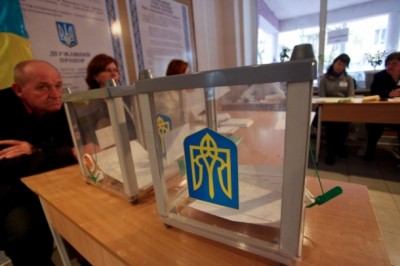In Ukraine, A Tale of Two Elections

The US government loves to “promote democracy” overseas, often at the barrel of a gun. Strangely enough, however, it often “deplores” actual elections being held in such places. Take Ukraine, for example. An election held last week by a group that forcibly seized power from a legitimately-elected government was hailed by the US administration as a great democratic achievement.
Said John Kerry about last week’s parliamentary election held by the post-coup government in Kiev:
We applaud Ukraine’s commitment to an inclusive and transparent political process that strengthens national unity. … The people of Ukraine have spoken, and they have again chosen to chart the course of democracy, reform, and European integration.
In this US-approved vote, the parties disapproved by the US were harassed and even essentially banned. But that’s OK.
However in eastern Ukraine, which refused to recognize February’s US-backed coup in the western part of the country, parliamentary and presidential elections scheduled for tomorrow are scorned and even “deplored” by the US administration.
The White House condemned tomorrow’s elections in eastern Ukraine in no uncertain terms:
We deplore the intent of separatists in parts of eastern Ukraine to hold illegitimate so-called local ‘elections’ on Sunday, November 2. If held, these ‘elections’ would contravene Ukraine’s constitution and laws and the September 5 Minsk Protocol.
So much does the US administration hate the idea of unapproved people voting, that it even refused to call them elections, placing the very term in “scare quotes.”
Shortly after the February coup in Kiev, referenda were held in Crimea and in parts of eastern Ukraine to determine whether to remain tied to Kiev or declare independence from the new regime. Those elections were also condemned by the US.
“We reject the ‘referendum’ that took place today in the Crimean region of Ukraine. This referendum is contrary to Ukraine’s constitution,” said the White House immediately after the March vote in that region. The February coup was also contrary to Ukraine’s constitution but that did apparently not bother Washington.
Similarly, when referenda were held in eastern Ukraine this spring to determine that region’s future course, the White House spokesmancondemned them as “illegal under Ukrainian law and a transparent attempt to create further division and disorder.”
When the wrong people hold votes, it seems, “division and disorder” are the result.
Those who overthrow democracy by force are legitimized – you might even say laundered – by an election they had no legal right to hold in the first place, while those who stood by previously-elected leaders and scheduled elections as a way out of the crisis caused by US interference are condemned, ignored, and not even recognized by the US government.
So here is the real message from the US government: elections overseas are only legitimate if we have pre-approved the parties allowed to stand and if we have pre-approved the outcome. The election must result in exactly the kind of “pro-West” government that we desire or we will begin destabilization and regime change, if completely ignoring the results does not do the trick.
Is that what John Kerry meant when he said, “you just don’t in the 21st century behave in 19th century fashion”?

